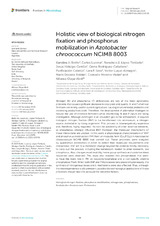Holistic view of biological nitrogen fixation and phosphorus mobilization in Azotobacter chroococcum NCIMB 8003
Autor
Biełło, Karolina A.
Lucena, Carlos
López Tenllado, Francisco Javier
Hidalgo-Carrillo, J.
Rodríguez Caballero, Gema
Cabello, Purificación
Sáez, Lara P.
Luque-Almagro, Víctor Manuel
Roldán, María Dolores
Moreno-Vivián, Conrado
Olaya-Abril, Alfonso
Editor
FrontiersFecha
2023Materia
Biological nitrogen fixationPhosphorus mobilization
Nitrogenase
Phosphatases
Azotobacter chroococcum
Proteomics
METS:
Mostrar el registro METSPREMIS:
Mostrar el registro PREMISMetadatos
Mostrar el registro completo del ítemResumen
Nitrogen (N) and phosphorus (P) deficiencies are two of the most agronomic
problems that cause significant decrease in crop yield and quality. N and P chemical
fertilizers are widely used in current agriculture, causing environmental problems and
increasing production costs. Therefore, the development of alternative strategies to
reduce the use of chemical fertilizers while maintaining N and P inputs are being
investigated. Although dinitrogen is an abundant gas in the atmosphere, it requires
biological nitrogen fixation (BNF) to be transformed into ammonium, a nitrogen
source assimilable by living organisms. This process is bioenergetically expensive
and, therefore, highly regulated. Factors like availability of other essential elements,
as phosphorus, strongly influence BNF. However, the molecular mechanisms of
these interactions are unclear. In this work, a physiological characterization of BNF
and phosphorus mobilization (PM) from an insoluble form (Ca3(PO4)2) in Azotobacter
chroococcum NCIMB 8003 was carried out. These processes were analyzed
by quantitative proteomics in order to detect their molecular requirements and
interactions. BNF led to a metabolic change beyond the proteins strictly necessary
to carry out the process, including the metabolism related to other elements, like
phosphorus. Also, changes in cell mobility, heme group synthesis and oxidative stress
responses were observed. This study also revealed two phosphatases that seem
to have the main role in PM, an exopolyphosphatase and a non-specific alkaline
phosphatase PhoX. When both BNF and PM processes take place simultaneously, the
synthesis of nitrogenous bases and L-methionine were also affected. Thus, although
the interdependence is still unknown, possible biotechnological applications of these
processes should take into account the indicated factors. Datos de investigación disponibles en: https://www.frontiersin.org/articles/10.3389/fmicb.2023.1129721/full#supplementary-material

